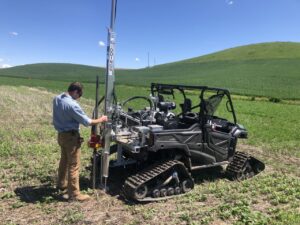Climate change, sustainability and food security are some of the global “grand challenges” facing the agricultural industry. The roots of these challenges are complicated, multifaceted and interconnected. To move the needle, we will need local solutions deployed across the globe, which is no small order. This will require scientific knowledge, and a lot of it.

To advance this effort in the U.S., the U.S. Department of Agriculture (USDA) established the Agricultural Research Service (ARS) in 1953 to deliver scientific solutions for these types of national and global agricultural challenges. The aim of ARS research is to deliver cutting-edge, scientific tools and innovative solutions for American farmers, producers, industry and communities. ARS laboratories across five regions of the country provide the field research to support this aim.
Some good news for Pacific Northwest growers is that the USDA’s Northwest Sustainable Agroecosystems Research Unit (NSARU) is located in Pullman, Washington, and is part of the Pacific West Area of the USDA-ARS. In 2021, NSARU hired four new scientists that joined Research Leader David Huggins, who was hired in 2020.
“These hires have tremendously increased our unit’s capacity to do relevant research — we emphasize that we want to be a problem-solving research group where our research priorities are identified by working closely with stakeholders such as the various commissions,” he said. Huggins is also a soil scientist with expertise in soil carbon cycling, nitrogen-use efficiency and conservation farming systems.
According to the unit’s website, NSARU works on technologies that mutually help growers more economically produce food, feed, fiber and fuel while enhancing air, soil and water resources. The group is part of the national Long-Term Agroecosystem Research Network, which is a collaborative of USDA and other scientific institutions working together to find innovative solutions for the sustainable intensification of agriculture. As one of 18 long-term research sites in the USDA network, what makes NSARU special is its research is focused on dryland agriculture of the Pacific Northwest region.
NSARU provides the scientific foundation to enhance decision support for precision and conservation agriculture and for cropping system intensification and diversification. That means they can provide a wealth of information for Pacific Northwest commodity farmers who are looking to do more with their ground without degrading, and instead regenerating, the natural resources of their farm for future generations.
The new Eastern Washington-based NSARU scientists are:
- Dr. Garett Heineck, cropping systems agronomist. Heineck’s expertise is with developing innovative cropping systems that are profitable, mitigate and adapt to climate change and weather extremes, provide diverse environmental services, and promote sustainable agricultural intensification.
- Dr. Joaquin Cassanova, remote sensing. Cassanova’s expertise is in utilizing ground- and satellite-based observations to assess soil and plant performance metrics and identify stresses associated with climate, weeds, pathogens, insects, nutrient deficiencies, poor soil health, and management at various spatial scales.
- Dr. Melissa LeTourneau, cropping systems modeler. LeTourneau’s expertise is in the development and use of process-oriented cropping systems models to simulate atmosphere-plant-soil continuum and the biophysical environment of agricultural systems to assess soil and plant performance from field to regional scales.
- Dr. Claire Phillips, air quality. Phillips’ expertise is to investigate and develop quantitative relationships between agricultural emissions (e.g. greenhouse gases, particulate matter, wind erosion) and factors such as soil properties, crop management, field hydrology, meteorology and climate change at various spatial scales.
These new scientists are now on board at NSARU and join support scientists Ian Leslie (soil physics), Bryan Carlson (ecoinformaticist, data management), and Dr. Jeremy Hansen (soil microbiologist); technicians John Morse, Ian Guest and Caven Halsey; a Washington State University laboratory support scientist, Jenny Carlson; and a new administrative person, Teri Hansen. In the next year, the unit is expected to grow even further as appropriations to address herbicide resistance and climate science will enable the addition of more technical expertise to support field and laboratory research efforts.
Together, with strong university scientist partnerships and working closely with producers and agribusiness, NSARU plans to find practical solutions to challenges in soil health (soil acidification, declining soil organic matter, soil erosion); viable cropping system alternatives (intercropping, perennial options, flex cropping); precision, site-specific decision support (crop health diagnostics, improving nutrient and water use efficiencies); and climate science (reducing greenhouse gas emissions, sequestering soil carbon).
More details and staff contact information are available online.
This article originally appeared in the July 2022 issue of Wheat Life Magazine.
